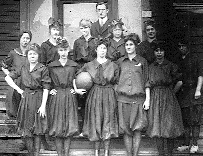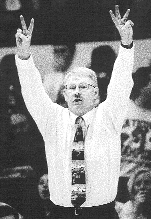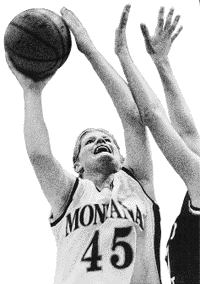
(PHOTO) A turn-of-the-century woman's basketball team warming up.
HUNDRED-YEAR-OLD HOOPS
by Zach Dundas
In 1902, there was no Title IX. No Women's World Cup. There was no WNBA, no NCAA, let alone a women's basketball final four. No woman would wear an Olympic uniform for the United States for two more years.
UM Women's basketball team (no date). There were, however, lady Grizzlies. The spiritual great-grandmothers of today's Linda Weylers and Lauren Coopers took to the hardcourt in Montana maroon, some years before the University got around to choosing its ursine mascot. In a world where "never let them see you sweat" was more than a corporate slogan, women at UM warred with rivals from around the state, battling for rebounds.
In the last weeks of 1902-seventy years before the federal government's Title IX opened the wide world of the NCAA to women and sixty-eight years before the modern Lady Griz-the first-ever UM women's sports team played its first game. On Friday, December 12, 1902, nearly 1,000 fans gathered at Missoula's Union Hall to witness the first home game of lady hoopsters. The headline blares from the Montana Kaimin, then a staid literary magazine and social chronicle: "UNIVERSITY GIRLS SUPERIOR TO HELENA BASKETBALL TEAM."
The Maroons took on five young ladies from Helena High School and, to judge by the journalist's report, the action was far different from croquet. Miss Lucy Stevens, Helena's center, slipped during a fierce scrimmage for the ball, smacking her head so hard she left the game for good. With body-sacrificing spirit like that, the prepsters gave the college women the game, but in the end superior tactical skills won the day. "The University women were more active and emerged from every sharp encounter with a display of decided strength," reads the fiercely subjective Kaimin. While Helena's defense was praised as "agile and clever," it was no match for Montana's Miss Mabel Jones, a powerhouse center and a noted "goal thrower."
A quick gloss of the game's action gives us the impression that Robin Selvig would have been right at home stalking the sidelines. The difference is in the details-for instance, the final score was just 12 to 7-and in the moments that survive in the record of this antique season. It was a world where, after Montana demolished Helena, the visitors were treated to dinner at Missoula's Cafe Royale. Chaperones tagged along on every road trip. When a girls' team from Fort Shaw Indian School thrashed the Montana girls-the first of two wins over the lily-white Missoula team-the Kaimin marked the occasion with curious doggerel. "They fought both hard and bravely / But when the time was done / The score did tell the story / The dusky maidens had won."
Such deceptively benign racial jibes tip off a modern fan to the changes-or supposed changes-since Mabel Jones, ever the star, led that pioneering squad in "snappy games" against the likes of Fort Shaw, Helena and Butte Parochial. But while social niceties have largely disappeared and the game has changed beyond recognition, something in the dusty accounts of Montana's first women athletes carries more than a whiff of the present.
"Our girls generalled their games better," reads an account of a loss to a rival then known as Montana Agricultural College. "But they were unprepared for the fierce and persistent blocking of Bozeman."
It seems tangling with the Bobcats is a tradition as old as UM lady hoopsters.
THE ROAD SHOWS OF 1999
Holst loses his "interim" title and goes full-time as Grizzly head coach. (PHOTO CAP 1)
Linda Weyler earned honorable mention All-America honors, scoring 18.9 points a game.by Zach Dundas
Since the Biblical story of Jesus' forty days in the wilderness, people have sought nature's solitude to spur spiritual growth. If that works, The University of Montana men's and women's basketball teams should be nearing sainthood after rough, lonely seasons in the wilderness.
During the sweeping renovation of the Adams Center (formerly known as the Harry Adams Field House), both teams played in the decidedly uncollegiate confines of Missoula's Sentinel High School. And if playing in front of sparse crowds-home attendance averaged just 2,306 for the men, 2,170 for the women-in a high school gym wasn't bad enough, both teams suffered devastating injuries to key players. Each team staged a late run to sweeten the memories of 1998 and '99 but was left looking to next year for a chance to regain past glories.
With a brand-new arena and a few bones to pick in the Big Sky, both programs promise an entertaining millennial season. Men's head coach Don Holst, for his part, boasts of an encouraging recruiting class, including Missoula Hellgate gunner Sam Riddle. "We're saying, let's get this thing rocking," Holst says.
The 1998-99 Grizzlies: Hitting the Wall
The men started the season with a grueling sojourn on the road, staging lightly attended nonconference "home" games in exotic spots such as Butte, Billings and Cut Bank. After an erratic warm-up season the Grizzlies fell into a perilous downward spiral in Big Sky Conference action, losing eight of their first nine league games.
"I don't think I would wish that kind of situation on anyone or on any program," says Holst. "We played one home game in November; one home game in December. I didn't realize how it would wear on us. But by January, we'd hit the wall emotionally."
Physical injuries piled on emotional stress. Senior guard Eric Bowie went down with a season-ending ankle injury just six games in; junior guard Kyle Keyes followed with a stress fracture; sophomore forward Ryan Slider exited with a concussion. For senior backup center Nate Sil, a football injury canceled the entire hoops season.
The uncertainty about Holst's future only added to the squad's burdens. Athletics Director Wayne Hogan named Holst, a longtime Griz assistant, as interim head coach when Blaine Taylor departed for an assistant's job at Stanford.
Despite the setbacks, the team mustered a revival in late winter, ending the season 13-14 and hammering eventual league champs Weber State 87-53 in an emotional frenzy of revenge. A last-game loss to Eastern Washington 81-75 kept Montana out of the league tourney, but relatively large, keyed-up crowds chanting "WE WANT DON"-not to mention some uncompromising statements from players-sealed the deal for Holst. The "interim" disappeared from his title four days after the season ended.
Linda Weyler earned honorable mention All-American honors, scoring 18.9 points a game. The 1998-99 Lady Griz: An Uncommon Year
Women's head coach Robin Selvig wanted more too. But his Lady Griz were bombarded by injuries as well-two all-conference starters and the team's only point guard went down. The team finished the season 12-15, their first losing record in years, and then crashed out of the Big Sky tournament in the second round.
"It was an interesting year," Selvig says of his twenty-first season. "We didn't have the kind of wins we were used to, but we hung in there and made a run at the end."
Selvig says the season was studded with great personal performances and all-around grit. The unquestionable highlight he points to is the play of junior forward Linda Weyler, an imposing player who averaged 18.9 points per game. "She was named Honorable Mention All-America," Selvig says. "And you can't argue with that."
With a corps of young players now more experienced than anyone ever expected, Selvig looks forward to avenging some of the tough Big Sky losses absorbed this year (MSU, this means you). "I think everyone is more excited about and more ready for next year than I can remember," says the longtime Lady Griz mentor.
Zach Dundas is now the music editor for Williamette Week.


